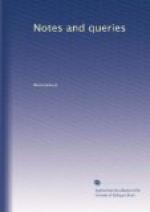“Mr. Goring’s army is broken and all his men in disorder. He hates the council here, and I find plainly there is no love lost; they fear he will seize on the Prince, and he, that they will take him: what will follow hereupon may be foretold, without the aid of the wise woman on the bank. Sir John Colepeper was at Court lately to remove him, to the discontent of many. In short, the war is at an end in the West; each one looks for a ship, and nothing more.
“Lord Digby and Mr.
Goring are not friends; Prince Rupert yet
goes with Mr. Goring, but
how long that will hold, I dare not
undertake, knowing both their
constitutions.”
It will be observed that the writer of the letter, though a cavalier, here calls him Mr. Goring, when as his father was created Earl of Norwich in the previous year, he was Lord Goring in cavalier acceptation.
He is indiscriminately called Mr. Goring and Lord Goring in passages of letters by cavaliers relating to the campaign in the West of 1645, which occur in Carte’s Collection of Letters (vol. i. pp. 59, 60. 81. 86.).
A number of letters about the son, Lord Goring’s proceedings in the West in 1645 are printed in the third volume of Mr. Lister’s Life of Lord Clarendon.
The Earl of Norwich’s second son, Charles, who afterwards succeeded as second earl, commanded a {87} brigade under his brother in the West in 1645. (Bulstrode’s Memoirs, p. 142.; Carte’s Letters, i. 116. 121.)
Some account of the father, Earl of Norwich’s operations against the parliament in Essex in 1648, is given in a curious autobiography of Arthur Wilson, the author of the History of James I., which is printed in Peck’s Desiderata Curiosa, book xi. part 5. Wilson was living at the time in Essex.
An interesting fragment of a letter from Goring the son to the Earl of Dorset, written apparently as he was on the point of retiring into France, and dated Pondesfred, January 26, 1646, is printed in Mr. Eliot Warburton’s Memoirs of Prince Rupert, iii. 215.
Mr. Warburton, by the way, clearly confounds the father with the son when he speaks of the Earl of Norwich’s trial and reprieve (iii. 408.). Three letters printed in Mr. W.’s second volume (pp. 172. 181, 182.), and signed “Goring”, are probably letters of the father’s, but given by Mr. Warburton to the son.
I perceive also that Mr. Bell, the editor of the lately published Fairfax Correspondence, has not avoided confusion between the father and son. In the first volume of the correspondence relating to the civil war (p. 281.), the editor says, under date January, 1646,—
“Lord Hopton in the
meanwhile has been appointed to the command
in Cornwall, superseding Goring.
Also has been sent off on
several negociations to France.”
Goring went off to France
on his own account; his father was at that
time Charles I.’s ambassador
at the court of France.




